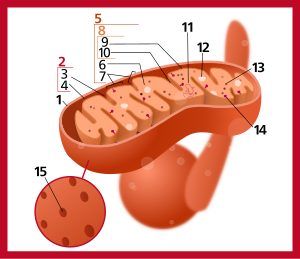線粒體嵴
| 細胞生物學 | |
|---|---|
| 線粒體 | |
 |
線粒體嵴(英語:mitochondrial cristae)簡稱「嵴」,是線粒體內膜向線粒體基質折褶形成的一種結構。線粒體嵴的形成增大了線粒體內膜的表面積,讓呼吸作用的耗氧化學反應可以更快進行。嵴膜上有很多蛋白質,包括ATP合酶和各種細胞色素。
形狀
[編輯]在不同種類的細胞中,線粒體嵴的數目、形態和排列方式可能有較大差別。線粒體嵴主要有幾種排列方式,分別稱為「片狀嵴」(lamellar cristae)、「管狀嵴」(tubular cristae)和「泡狀嵴」(vesicular cristae)。[1]片狀排列的線粒體嵴主要出現在高等動物細胞的線粒體中,這些片狀嵴多數垂直於線粒體長軸;管狀排列的線粒體嵴則主要出現在原生動物和植物細胞的線粒體中。有研究發現,睾丸間質細胞中既存在層狀嵴也存在管狀嵴。[2]某些形態特殊的線粒體嵴由於沒有ATP合酶,所以不能合成ATP。
目前不清楚這些形狀的產生是否共用一種模式。泡狀嵴等不合成ATP的結構可能不屬於線粒體嵴。[3]
結構
[編輯]當科學家發現線粒體有兩層膜之後,線粒體亞顯微結構的先鋒們提出了三種結構假說:[4]
- 導風板模型(baffle, 1953):帕拉德認為,線粒體嵴內膜像導風板一樣排列,嵴內外空間的開口很大。這個模型被相信了很久,是教科書用圖的主要模型。
- 隔膜模型(septa, 1953):斯特蘭德認為,線粒體內膜的排列像一層層隔膜一樣,把線粒體基質切開。[5]
- 嵴口模型(crista junction, 1966):達姆斯和威斯認為,線粒體嵴內外由嵴口這一種細小的管狀結構連接。這些結構最近(2008)經過電子顯微鏡斷層成像技術被重新發現,成為了目前主要接受的模型。[6]
線粒體嵴上有許多有柄小球體,舊稱線粒體基粒(elementary particle)或氧化體(oxysome),基粒中含有ATP合酶,能利用呼吸鏈產生的能量合成三磷酸腺苷(ATP)。所以需要較多能量的細胞,線粒體嵴的數目一般也較多。[7]ATP合酶在膜內形成二聚體。這些二聚體會排成長條,讓內膜形成彎曲,可能是嵴形成的第一步。[8]這些二聚體處於嵴的最內側。[9]
線粒體嵴口上排列着一種叫做線粒體接觸部位嵴組織體系(contact site cristae organizing system, MICOS)的蛋白質複合體。OPA1等蛋白質負責嵴的重塑。[9]
功能
[編輯]線粒體嵴主要負責ATP合成。
某個對數學模型的研究指出,絲狀線粒體的線粒體嵴的光學性質可能影響該線粒體所屬組織的光的產生與傳播。[10]
參考文獻
[編輯]- ^ Hanaki M, Tanaka K, Kashima Y. Scanning electron microscopic study on mitochondrial cristae in the rat adrenal cortex. Journal of Electron Microscopy. 1985, 34 (4): 373–380. PMID 3837809 (英語).
- ^ Frederick P. Prince. Mitochondrial cristae diversity in human Leydig cells: a revised look at cristae morphology in these steroid-producing cells. Anat Rec. Apr 1, 1999, 254 (4): 534–541. PMID 10203260 (英語).
- ^ Stephan, Till; Roesch, Axel; Riedel, Dietmar; Jakobs, Stefan. Live-cell STED nanoscopy of mitochondrial cristae. Scientific Reports. 27 August 2019, 9 (1). doi:10.1038/s41598-019-48838-2
 .
.
- ^ Griparic, L; van der Bliek, AM. The many shapes of mitochondrial membranes.. Traffic. August 2003, 2 (4): 235–44 [2020-02-06]. PMID 11285133. doi:10.1034/j.1600-0854.2001.1r008.x. (原始內容存檔於2020-02-05).
- ^ Sjostrand, F. Systems of double membranes in the cytoplasm of certain tissue cells. Nature. Jan 3, 1953, 171 (4340): 31–32. doi:10.1038/171031a0.
- ^ Zick, M; Rabl, R; Reichert, AS. Cristae formation-linking ultrastructure and function of mitochondria.. Biochimica et Biophysica Acta. January 2009, 1793 (1): 5–19. PMID 18620004. doi:10.1016/j.bbamcr.2008.06.013.
- ^ Frederick P. Prince. Lamellar and tubular associations of the mitochondrial cristae: unique forms of the cristae present in steroid-producing cells. Mitochondrionjili. Feb 2002, 1 (4): 381–389. PMID 16120292. doi:10.1016/S1567-7249(01)00038-1 (英語).
- ^ Blum TB, Hahn A, Meier T, Davies KM, Kühlbrandt W. Dimers of mitochondrial ATP synthase induce membrane curvature and self-assemble into rows. Proceedings of the National Academy of Sciences of the United States of America. March 2019, 116 (10): 4250–4255. PMID 30760595. doi:10.1073/pnas.1816556116.
- ^ 9.0 9.1 Baker, Nicole; Patel, Jeel; Khacho, Mireille. Linking mitochondrial dynamics, cristae remodeling and supercomplex formation: How mitochondrial structure can regulate bioenergetics. Mitochondrion. November 2019, 49: 259–268. doi:10.1016/j.mito.2019.06.003.
- ^ Thar,R. and M.Kühl. Propagation of electromagetic radiation in mitochondria? (PDF). J.Theoretical Biology. 2004, 230 (2): 261–270 [2022-07-13]. (原始內容 (PDF)存檔於2013-07-18) (英語).
